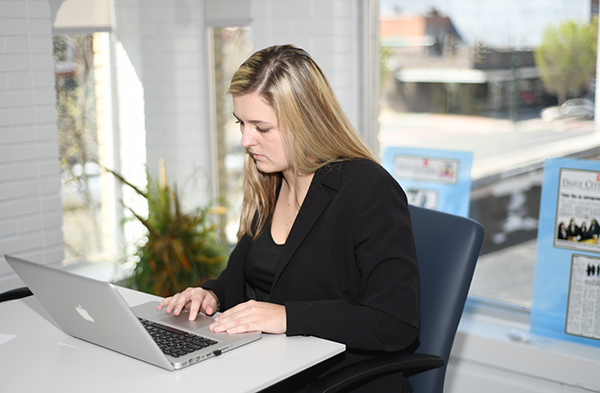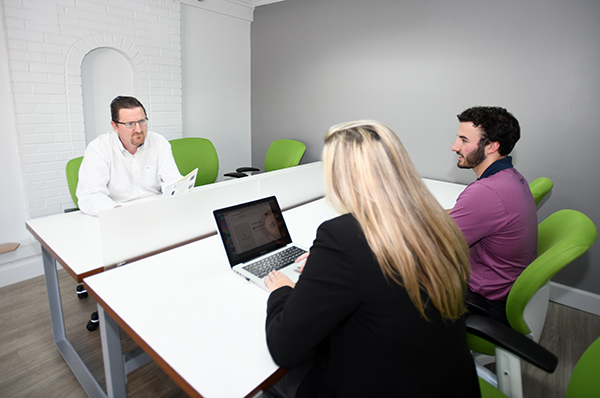News
Students Gain Real-World Experience at Dalton Innovation Accelerator
04/04/19
 Thomas Blackwell has been given an opportunity not available to many college students.
Thomas Blackwell has been given an opportunity not available to many college students.
His work on marketing projects for one of Dalton’s successful industries could have a lasting impact on the company. And the business management major at Dalton State doesn’t take that responsibility lightly.
“The experience I’ve been given is preparing me up for the real world,” said Blackwell, who graduates in May. “I sit in class now and hear things, and I think of how this can help. I think about my work even when I’m not working on it. I want good things for the business, and I feel confident the work I’m doing will help them succeed.”
Blackwell is one of 13 business students this semester who are in an entrepreneurship class working in the recently opened Dalton Innovation Accelerator downtown. The accelerator is a startup incubator located in the historic Landmark Building with numerous community partners including the Wright School of Business, Inventure IT, Barrett Properties, Believe Greater Dalton, and the Downtown Dalton Development Authority, as well as community leaders Bryan and Debbie Macon.
Dalton State students provide support to startup businesses and companies that are already established but need assistance with a specific project. The students complete projects ranging from marketing research to building a webpage to planning and setting up for an event or business meeting.
“We have some students working on projects specifically for the accelerator, some projects for startups, and some for local businesses and nonprofits,” said Barry Slaymaker, a part-time business professor and vice president of Barrett Properties, which owns the Landmark Building.
“We have six different organizations we’re working with right now,” he said. “This exceeds my expectations for our first semester. It is amazing when we offer free work how quickly people respond. There’s a wide variety of projects, and our students have a little bit of everything going on right now. They can gain experience in a many different areas of business.”
Angel Rodriguez, who is double majoring in marketing and business management, is already a business owner of Dalton Food Runners, a local dinner delivery company. Being in the accelerator class has helped him strengthen his own business and marketing efforts.
“I have been running my business out of my home,” he said. “I see now how much better a business can run in the right space. I like that this is a modern office space, not cubicles. The project I’m working on with the Dalton Little Theatre has taught me key skills I’ll be able to carry over into my own business. I’m learning I don’t have to do it all. It’s OK to delegate some of these responsibilities.”
Blackwell and Nich Bartley are both working on projects for Andreas Bruhwiler, president and owner of Alrol of America. Bruhwiler is originally from Switzerland so the students have had to adjust to working with someone from a different culture.
“I think continuously about what I’ve learned about international business,” said Bartley, a marketing major. “Even though this is a Dalton-based company, Andreas is not from the U.S. and does things differently. It was a bit of a challenge at first, but I began to see the benefits of his way of managing.”
 “Andreas gives us milestones and we have deadlines to meet those,” Blackwell said. “But I find we work consistently and don’t procrastinate. Sometimes, in a class, we put off work until the last-minute. But we’re not doing this here. This is giving us a hands-on experience. We aren’t taking tests or sitting in lectures.”
“Andreas gives us milestones and we have deadlines to meet those,” Blackwell said. “But I find we work consistently and don’t procrastinate. Sometimes, in a class, we put off work until the last-minute. But we’re not doing this here. This is giving us a hands-on experience. We aren’t taking tests or sitting in lectures.”
Students are learning self-accountability, time management, and better communication skills as they are honing the hard skills learned in classes.
“I’m learning how to communicate with people in a business setting,” said Taylor Bailey, a management information systems major, who is working to increase visibility of the accelerator. “In class if we’re not doing a project, we’re not going to stand up and talk to people. But here, you have to. Communication skills in the workplace has been the biggest part of what I’ve learned at the accelerator.
“Representing this place is a real-world experience for me,” she said. “I’m dealing with local business people, not just other classmates and professors.”
The accelerator class is structured more like an internship than a traditional class. Students set their own hours and are responsible for their own work.
“I’m not here all the time,” Slaymaker said. “I’m not here to hold hands or make sure everybody is here every time they’re supposed to be, and that hasn’t been an issue. They’re responsible students, and they’re about to graduate. The students have shown a tremendous level of maturity. They are professionals. I have no qualms about them working with our businesses.”
One idea Slaymaker teaches his students, whether in the traditional classroom or in the accelerator, is that they must become comfortable with the unknown.
“Be comfortable with ambiguity, and be ready to work hard,” he said. “We’re putting our students next to and in meetings with CEOs, presidents, and vice presidents. They learn real-world skills here in this safe environment. Students in this class will engage across the spectrum of the business world. They’re very visible. No one here is able to hide in their back office and peck away at a computer for four months as an intern. You will see and be seen here at the accelerator.”
Ensuring students are ready for their first job after graduation is a priority for the WSOB.
“The Dalton Innovation Accelerator has not only expanded the presence of DSC's WSOB to downtown Dalton, but it has also added a level of interaction for our students with the business community, further preparing them for the world of work,” said Dr. Marilyn Helms, dean of the WSOB. “Many of our business majors consider self-employment as a future career goal. Assisting the area's nascent entrepreneurs is a valuable learning experience for our students. As they help these Dalton businesses in their incubation with setting up a website and social media presence, researching competitors, initializing accounting practices and a host of other tasks, these students better understand the steps involved in the entrepreneurship process.
“The more our students are involved at this early level, as juniors and seniors, with the business community, the better for us all,” Helms said. “Students are quite pleased with their work, and I'm extremely pleased with their growth this semester. This community interaction supports the mission of DSC as well. WSOB faculty are involved in a host of high-impact practices, and this is one of our shining examples within the WSOB curriculum.”
